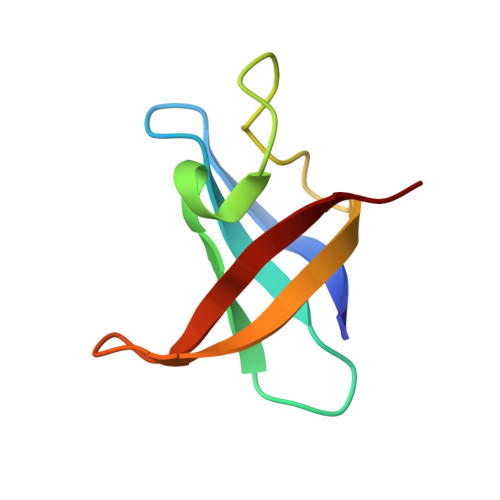Recognition of T-rich single-stranded DNA by the cold shock protein Bs-CspB in solution.
Zeeb, M., Max, K.E., Weininger, U., Low, C., Sticht, H., Balbach, J.(2006) Nucleic Acids Res 34: 4561-4571
- PubMed: 16956971
- DOI: https://doi.org/10.1093/nar/gkl376
- Primary Citation of Related Structures:
2F52 - PubMed Abstract:
Cold shock proteins (CSP) belong to the family of single-stranded nucleic acid binding proteins with OB-fold. CSP are believed to function as 'RNA chaperones' and during anti-termination. We determined the solution structure of Bs-CspB bound to the single-stranded DNA (ssDNA) fragment heptathymidine (dT7) by NMR spectroscopy. Bs-CspB reveals an almost invariant conformation when bound to dT7 with only minor reorientations in loop beta1-beta2 and beta3-beta4 and of few aromatic side chains involved in base stacking. Binding studies of protein variants and mutated ssDNA demonstrated that Bs-CspB associates with ssDNA at almost diffusion controlled rates and low sequence specificity consistent with its biological function. A variation of the ssDNA affinity is accomplished solely by changes of the dissociation rate. 15N NMR relaxation and H/D exchange experiments revealed that binding of dT7 increases the stability of Bs-CspB and reduces the sub-nanosecond dynamics of the entire protein and especially of loop beta3-beta4.
- Laboratorium für Biochemie, Universität Bayreuth, D-95440 Bayreuth, Germany.
Organizational Affiliation:
















